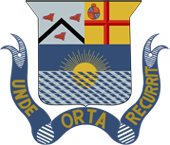
Presidency College is an art, commerce, and science college in the city of Chennai in Tamil Nadu, India. On 16 October 1840, this school was established as the Madras Preparatory School before being repurposed as a high school, and then a graduate college. The Presidency College is one of the oldest government arts colleges in India. It is one of two Presidency Colleges established by the British in India, the other being the Presidency College, Kolkata.
The Justice Party, officially the South Indian Liberal Federation, was a political party in the Madras Presidency of British India. It was established on 20 November 1916 in Victoria Public Hall in Madras by Dr C. Natesa Mudaliar and co-founded by T. M. Nair, P. Theagaraya Chetty and Alamelu Mangai Thayarammal as a result of a series of non-Brahmin conferences and meetings in the presidency. Communal division between Brahmins and non-Brahmins began in the presidency during the late-19th and early-20th century, mainly due to caste prejudices and disproportionate Brahminical representation in government jobs. The Justice Party's foundation marked the culmination of several efforts to establish an organisation to represent the non-Brahmins in Madras and is seen as the start of the Dravidian Movement.
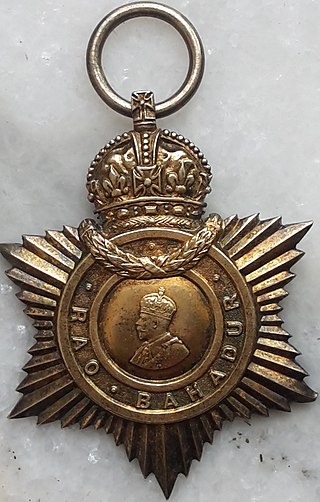
Rai Bahadur and Rao Bahadur, abbreviatedR.B., was a title of honour bestowed during British rule in India to individuals for outstanding service or acts of public welfare to the Empire. From 1911, the title was accompanied by a medal called a Title Badge. Translated, Rai or Rao means "King", and Bahadur means "Brave". Bestowed mainly on Hindus, the equivalent title for Muslim and Parsi subjects was Khan Bahadur. For Sikhs it was Sardar Bahadur.

Velayudhan Chempakaraman Thampi ofThalakulam (1765–1809) was the Dalawa or Prime Minister of the Indian kingdom of Travancore between 1802 and 1809 during the reign of Bala Rama Varma Kulasekhara Perumal. He is best known for being one of the earliest individuals to rebel against the British East India Company's authority in India.
G. Parameswaran Pillai (1890–1963), also known as "GP", was the Chief Secretary and Officiating Dewan of the erstwhile Travancore kingdom in pre-Independent India. He started his career as a lawyer, and later became Judge of the Court of Travancore, before joining the administration. The Maharaja of Travancore eventually conferred on him the title of Rajyasevapraveena.
Sir Narayanan Raghavan Pillai, of Elenkath, KCIE, CBE, popularly known as "Rag", was an Indian civil servant. He served as the first Cabinet Secretary in independent India, 1950–1953, and as the second Secretary General in the Ministry of External Affairs, He also served as India's Ambassador to France.

Cannankara Velayudhan Raman Pillai, also known as C. V., was one of the major Indian novelists and playwrights and a pioneering playwright and novelist of Malayalam literature. He was known for his historical novels such as Marthandavarma, Dharmaraja and Ramaraja Bahadur; the last mentioned considered by many as one of the greatest novels written in Malayalam.

Sir Amaravati Seshayya Sastri, or Sashiah Sastri, was an Indian administrator who served as the Diwan of Travancore from May 1872 to 4 May 1877 and as the Diwan of Pudukkottai from 1878 to 1894. He is credited with having modernized the city of Pudukkottai.
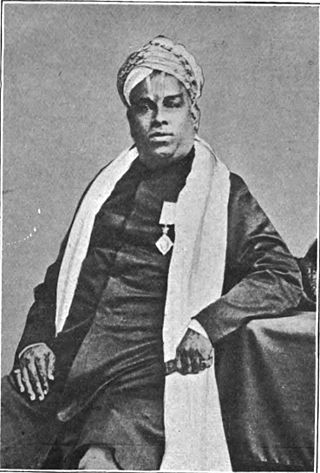
Vembaukum RamiengarCSI, also rendered Vembakkam and Rama Iengar, was an Indian civil servant, administrator, and statesman who served Sir Visakham Thirunal Rama Varma V, Maharaja of Travancore and his successor Sir Mulam Thirunal Rama Varma VI, as Diwan of Travancore from 1880 to 1887 after a lengthy career in governance in the Madras Presidency, culminating in his membership of the Madras Legislative Council from 1867 to 1879. He was a trustee of Pachaiyappa's Charities, and a member of the powerful and accomplished Vembaukum clan of Vadakalai Iyengar Brahmins originating in Vembakkam, which also produced or encompassed such contemporaries as lawyers V. Sadagopacharlu and V. Rajagopalacharlu, and Sir V. Bhashyam Aiyangar; and Mysore Dewan C. V. Rungacharlu.
Mylai Chinna Thambi Pillai Rajah was an Indian politician, educationist, social and political activist from the Indian state of Tamil Nadu.
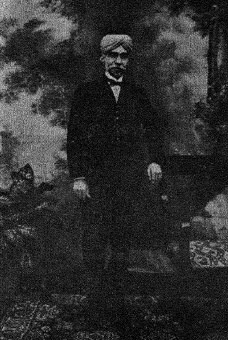
Khan Bahadur Sir Muhammad Habibullah KCSI KCIE was an Indian politician and administrator who served as the Diwan of Travancore from 1934 to 1936.

Diwan Bahadur Lewis Dominic Swamikannu PillaiCIE, ISO was an Indian politician, historian, linguist, astronomer and administrator who served as the second President of the Madras Legislative Council.

Dewan Bahadur Sir Raghupathi Venkataratnam Naidu was an Indian social reformer and educationist who hailed from present-day Andhra Pradesh. He was described as "the most powerful orator of his day". He worked for the eradication of untouchability and upliftment of Dalits. He strived for the reformation of the Devadasi system in Andhra, and succeeded to a considerable extent. He promoted widow remarriages and encouraged women's education.
Pillai, meaning Prince, is a title of nobility which can either refer to a ruling chief, members of the nobility, or junior princes of the royal family and was mostly used by the upper-caste Nair feudal lords who were historically ranked as or immediately below the king. The oldest lineages of Pillais include not only Kshatriyas but also brahmins who took up the sword. From the early modern period, the title also came to be bestowed upon Savarna subjects by the Kings for services military or political, most of whom were of Nair origin.

Diwan Bahadur Chinna Seevaram Ratnasabhapathy Mudaliar was an Indian industrialist and politician who served as a member of the Madras Legislative Council from 1926 to 1936. His family hails from Seevaram village near Cheyyar of North Arcot district.

Dewan Khan Bahadur P. Khalifullah (1888–1950), was a politician of the Madras Presidency, British India, who served as the minister for public works in the short-lived ministry of Kurma Venkata Reddy Naidu from April–July 1937. He was a Tamil Muslim belonging to the Rowther community, and his father was a wealthy businessman of Tiruchirapalli. Born in 1888 in Tiruchi into a wealthy rice merchant's family, his birth name was Mohamed Pichai Rowther Ibrahim Khalifullah. He went on to be known by the honorific Khan Bahadur, a title bestowed on him by the British. In later years, his work as the Dewan of Pudukottai made him more popular as ‘Dewan Khalifullah.’
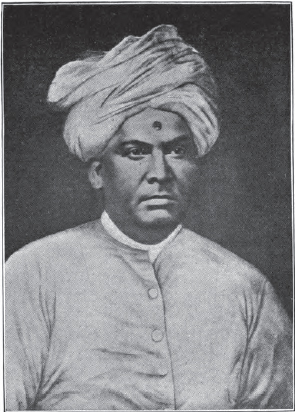
The Right Hon.Calamur ViravalliRunganada Sastri was an Indian interpreter, jurist, civil servant, polyglot, and social reformer, who was known for his mastery over Indian and foreign languages alike in both classical and vernacular forms, as well as his general erudition and command of jurisprudence. At his death, he is known to have mastered fourteen languages, and had a conversational command of at least two to four more.

Rai Sahib / Rao Saheb / Roy Sahib / Rao Sahib was a title of honour issued during the era of British rule in India to individuals who performed faithful service or acts of public welfare to the nation. From 1911 the title was accompanied by a special Title Badge. Translated, Rai means "King" Sahib means "Leader". Awarded during the reign of George VI. For another image of the badge see link This was the start level title usually awarded to civilians, which could later be upgraded to Rao Bahadur and then to Dewan Bahadur titles.

Dewan Bahadur or Diwan Bahadur was a title of honour awarded during British rule in India. It was awarded to individuals who had performed faithful service or acts of public welfare to the nation. From 1911 the title was accompanied by a special Title Badge. Dewan literally means Prime Minister in Indian context and Bahadur means brave.
The Sheriff of Madras was an apolitical titular position of authority bestowed for one year on a prominent citizen of Madras. The post was abolished in 1998.
V. Thirumalai Pillai was Dewan Bahadur and not Rao Bahadur














